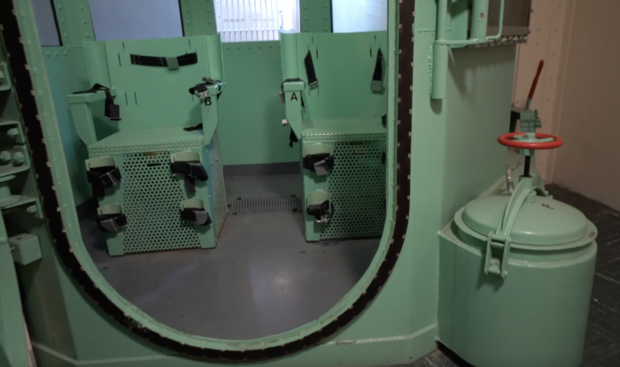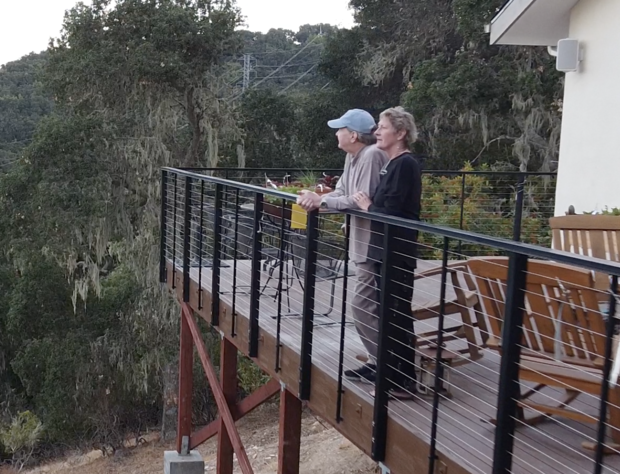ATASCADERO – They had an unusual, some would say bizarre, relationship. A California couple who spent 20 years visiting and exchanging letters with a notorious serial killer on San Quentin’s death row is now sharing their story following his death in September.
Anthony John “Jack” Sully was a former Millbrae police officer who went on a drug-fueled killing spree in the San Francisco Bay Area 40 years ago that ended the lives of five young women and one man in their teens and early twenties. Some were tortured, at least one was raped; all were shot, stabbed or beaten to death. Sully stuffed three of the bodies into steel drums that he dumped in Golden Gate Park.
Three of Sully’s associates were charged as accomplices, but only one remains in prison and he is eligible for parole.
Most will remember Sully as a ruthless killer and will certainly not mourn his death from natural causes on September 8. But Kent Nielsen says he cried when he heard the news.
“He was a friend that I cared about,” said Kent, 70. “I know people are going to think, ‘How? How could you care about a guy like that?’ “
To try to explain those feelings, one must go back to 1969 and a Mobil service station in downtown Millbrae where the 16-year-old Kent had taken his first job. The Mobil station serviced patrol cars for the Millbrae Police Department.
“It was during that time that I met (Sully), who was a police officer,” said Kent. “And I became friendly with him, as I did with all the officers.”
Sully, then 25, moonlighted at the service station on Saturdays and also started an electrical contracting business on the side in which Kent would occasionally help. Later, Sully invited Kent to his wedding.
Sully left the police department in 1974 while Kent moved to the East Bay and both fell out of touch with each other.
Then came the shocking newspaper headlines in 1983 regarding what would ultimately total six savage murders that took place in the Burlingame warehouse where Sully lived and ran his contracting business. Kent, of course, became aware of the sensational murder case involving a man he had once considered a friend but made no attempt to contact him.
California Dept. of Corrections and Rehabilitation
In 1986, a San Mateo County jury found Sully guilty of all six killings and recommended death in the gas chamber. Sully arrived on death row 12 days later.
It would take 16 more years for Sully and Kent to reconnect.
In 2002, Kent and his wife, Debbie “DJ” Nielsen, happened to see a true-crime TV show that featured the Sully case.
“And I said, ‘Boy, I wonder what’s going on with him,’ ” Kent recalled.
Kent wrote a letter to Sully at San Quentin asking if he’d like a visit and Sully quickly replied that he would. On that first visit, Kent admits to being nervous about meeting the man he’d always known by his nickname, Jack.
“I mean, I had known Jack previously but I hadn’t seen him in, what, 30 years?” Kent explained while adding that there turned out to be no shortage of conversation between the two.
“After that and after every other visit, Jack would stand up and he would look me straight in the eye, shake my hand firmly, and say, ‘Thank you,’ ” Kent said.
That first time, DJ waited in the car outside the prison reading a Harry Potter book. Sully insisted Kent bring her along for the following visit, which eventually led to 20 years of in-person meetings with Sully roughly once a month. Over that period, the couple exchanged hundreds of cards and letters with Sully, who meticulously numbered each mailing. By June 2020, Sully had sent the Nielsens 461 pieces of mail.
“And he absolutely loved every letter, every picture, everything that we did,” said DJ. “Because we were his life and he lived it vicariously through us.”
George Warren
Full disclosure: DJ Nielsen is reporter George Warren’s first cousin. He only recently learned about Kent and DJ’s connection with Sully which, for the past 20 years, they only shared with their closest friends.
The conversations generally involved the mundane — travel, art, food, prison life — but Kent says an important element of his relationship with Sully is that Sully told him there was nothing off limits in their conversations. Nothing.
“He told me if there were any questions I want to ask him, feel free,” Kent said. “You know, he was open to it.”
There must certainly be questions surrounding that six-month murderous crime spree that have never been answered. Sully appeared to be offering Kent the opportunity to learn details of the crimes nobody else had ever known, including, of course, the reason why Sully found it necessary to kill six people in cold blood who had never harmed him.
But with only some mild regret now that Sully’s dead, Kent admits he never asked any questions about the things that sent Sully to death row.
“He would have told me whatever I wanted to know. I know he would,” Kent said. “But that’s not what was important to me. That wasn’t the driving force of me being there.”
Kent was asked if it was possible he didn’t want to hear the terrible details coming out of Sully’s mouth.
“Could be a possibility. Could be, because that’s not what I knew of that man,” he replied.
Ironically, California’s death row turned out to be a relatively safe place for Sully and the more than 600 other condemned inmates to be housed. California has only carried out 13 executions since Sully’s arrival in 1986, and with the state gradually moving away from capital punishment, the likelihood of Sully’s execution became increasingly remote.
Kent and DJ moved from the Napa Valley to the central California coast a few years ago and the distance made their prison visits less frequent. Sully had battled cancer before and as his health steadily declined, he insisted they cut off communication altogether.
In the early morning of September 8, Kent and DJ’s phone rang. It was the Marin County coroner informing them that Jack Sully had died of natural causes at age 79 at a medical facility outside the prison. An Atascadero police officer later came to their home to make a formal in-person notification.
At the very end, Anthony John “Jack” Sully had no family and had stopped corresponding with his only friends. But the county coroner had no one else to call other than the man listed on Sully’s visitation records.
“You were essentially his next-of-kin?” Kent was asked. “Correct,” he replied.
This post was originally published on this site be sure to check out more of their content.








